Jesus
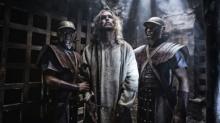
Studios and filmmakers are rediscovering a classic text as source material for upcoming mainstream films: the Bible.
Nearly 10 years after the blockbuster success of Mel Gibson’s “The Passion of the Christ,” which earned $611.9 million worldwide, studios are looking to the Good Book for good material.
Alongside the string of upcoming Bible-related films, producers from the History channel’s “The Bible” miniseries just announced that the series’ film adaptation “Son of God” will be released in theaters nationwide in February with 20th Century Fox.

Yesterday, I read about the 2-year old child who shot herself by accident in North Carolina over the weekend. Then I read about the horror of another school shooting in Nevada. Only hours later — shots rang out again on our block in North Philadelphia, for the second time this week. This time a bullet went through the window of one of the houses owned by our non-profit.
I was talking to a friend about my anger over the 300 lives lost in our city this year to gun violence. With the most sincere intentions, my friend said in an attempt to console me: “It’s just the way the world is.”
I’m not willing to give up that easy. It may be the way the world is today, but it doesn’t have to be the way the world is tomorrow.

Author Malcolm Gladwell may not be known for writing on religion. His New York Times best-selling books “The Tipping Point,” “Outliers,” “Blink” and “What the Dog Saw” deal with the unexpected twists in social science research. But his newest book, “David and Goliath: Underdogs, Misfits, and the Art of Battling Giants,” also includes underlying faith-related themes, and not just in the title.
Gladwell said that while researching the book, he began rediscovering his own faith after having drifted away. Here, he speaks with RNS about his Mennonite family, how Jesus perfectly illustrates the point in his new book and how Gladwell’s return to faith changed the way he wrote the book.

Editor's Note: The following is the text of a sermon preached on Oct. 7 at the weekly chapel service at American Baptist Seminary of The West in Berkeley, Calif.
A woman struggling with postpartum depression died last week, killed either when her car crashed into the gates of the White House or by the bullets fired upon her by security guards and police. Her child survived without physical injury.
Social media were alive with speculations of terrorism, domestic or international, with connections between this incident and the government shutdown, with any number of theories about gun violence. We were ready for it. Raw and weary before the story even came to light, we were primed for the explosion of speculation and public bewilderment.
Have you not known?
Have you not heard?
It's a terrible story from every angle. We have so many such stories describing what is happening in our nation lately. We have much of ourselves invested in every aspect of the shutdown.
We are raw.
The spiritual noise is deafening.
We are rendered blind by all we see. It is too much.
It is as if the prophets are silenced;
souls have been rendered mute, blind, and deaf.
Have you not known?
Have you not heard?
Events such as these touch a raw place in our souls. Our souls struggle to proclaim the greatness of the Lord. So we turn instead to the sourness of our neighbor. We proclaim their deficits to the highest heaven.

1) Jesus Avoided Labels
In fact, a large part of his ministry was breaking down preconceived titles, trying to bring about a world where there would be no differentiation between Jew or Gentile. He promoted the idea that loving God trumped racial, ethnic, social, religious, and political identities.
This doesn’t mean we’re simply “all the same underneath.” Jesus recognized that people had distinct differences, on both a personal and communal level. He embraced unique cultures and traditions and utilized them to reveal his glory, recognizing and valuin
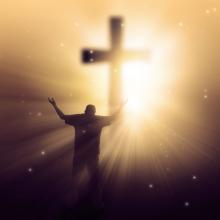
So, here's the thing. I just met Rev. Alfred Williams. He's a retired UCC pastor. At 81, he's still preaching and teaching. He's still asking great questions and pushing congregations to do the same. When I am his age, I hope to be as passionate. Hell, I wish I were as passionate now. With that introduction, I want to share this sermon that he preached on Aug.18 of at Ladera Community Church.
I think this sermon serves to blow apart some of our assumptions about generational differences within church leadership. He preached on Mark 8:27-33.
WATCHING THE PBS Frontline documentary “Top Secret America” in April reminded me of why I read the gospels. They help me get my head screwed on right—upside-down, that is.
In that show, Pulitzer-Prize-winning reporter Dana Priest investigates the secret history of anti-terrorism in America since 9/11. “Secret” is the key word, since the public has little idea of the injustice, torture, black sites, civilian-killing drone strikes, data-mining, over-surveillance, and general terrorizing that have been done in our name and with our tax money for the past 12 years. The Boston Marathon bombings will only up the ante.
“Empire,” I think as I watch. Our American empire has secret tentacles in every part of our inhabited world. Cofer Black, then head of the CIA’s Counterterrorism Center, announced after we were attacked on 9/11, “The gloves come off!” In other words, we will do whatever it takes to obliterate al Qaeda. “We went in [to Afghanistan] to kick ass. And we did!”
Restraining gloves have apparently stayed off, since little has changed in the Obama administration. No current national security big shot would speak to Frontline. It’s “top secret,” of course, since in public we are supposed to be a democracy and not an empire.
I THINK OF texts from the gospel of Matthew—radical texts penned under the thumb of the Roman Empire. A couple of years ago, I was asked to write “insight essays” for a teacher’s guide in the “Gather ’Round” series of Sunday school lessons for children and youth published by the Brethren Press and MennoMedia. The first seven lessons leading up to Easter were centered on texts from Matthew 18-28. I struggled to find a common thread running through these stories and sayings leading up to the final events in Jesus’ life.
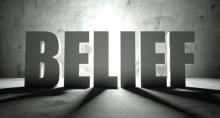
There are lots of biases and assumptions about Christians out there, many of which are founded in real-life experience. And yes, we Christians have done our share of damage when it comes to tarnishing our so-called “brand.” But there also seems to be this tendency to understand Christianity and its adherents as one generally monolithic group that can be described in simple (often negative) terms that they would never be acceptable to apply to any other group.
Part of this is because of the historic dominance of the Christian culture in the modern Western world. It’s the same reason that stereotypes of men on network sitcoms are pervasively unflattering, while the same stereotypes would cause a firestorm of negative publicity if applied to the female counterparts. Some of this is entirely warranted and necessary in tearing down false or damaging constructs of power. But sometimes, if we’re being honest, they’re just wrong. And stupid.

They have many labels. Undocumented immigrants. Illegal Immigrants. Illegal Aliens. Wetbacks. Jan Brewer, the governor of Arizona, recently suggested that most of them are “drug mules.” Some have even called them “terrorists.” But few are known by their real names or treated as people with real lives.
Most of them live at the edges of the society, under inhumane and dangerous conditions, often separated from their loved ones. For some it may be a choice. However, a vast majority of the 11 million undocumented immigrants in the U.S. are driven to such extremes by factors beyond their control — political crisis, drug-related violence, famine, or eviction from their own homes at gunpoint. Theirs is a story of displacement, of being forced to flee their homes and take risks few would under normal circumstances. They are victims, not the offenders they are often made out to be. Still, for many, it is a story of being treated by the border security as violent criminals, being stripped of their clothes and dignity and separated from their families and traumatized in detention centers. It is also a story of ostracizing and exploitation by parts of the society. The labels and stereotypes about them “otherize” them in ways that prevent their full participation in the society. Injustices like these are the reason why NETWORK’s Nuns On The Bus have been touring across the country speaking out for immigration reform.

A few years ago I wrote a book about the experience of watching 24 consecutive hours of bad Christian television. My friends and family signed up for an hour each to watch along with me. The whole thing was insane, but things got especially crazy around 1 a.m. when a show called the Power Team was on. Now, thePower Team are a bunch of enormous steroid-muscled men who hold really loud Christian rallies in which they tear phone books in two and break 2x4s over their heads by the power of the Holy Spirit. And they talk a lot about what “the Lord” had done for them. It’s impressive stuff.
Anyway, so our own Andie Lyons was watching with me along with my friend Jerry. And the three of us watched in stunned silence for a moment trying to understand what it was we were seeing, at which point Andie finally said “so wait, basically they break stuff for the Lord?” and I answered yes, and then Jerry said “big deal, I break stuff all the time,” to which Andie asked, “but is it for the Lord?” and Jerry said, “well, it is now!”
Honestly the only reason I told you this story is by way of saying that I’m not a fan of the over-use of the term “the Lord. ”Like when people say “I just love the Lord,” I just never really know what that means. The way it’s casually thrown around makes me uncomfortable especially after Harry Potter, since Voldemort is called the Dark Lord. I just, I don’t know, I’m not saying it’s wrong, I’m just saying that for whatever reason, I can’t handle it.
Paul Rand quoted scripture and used biblical principles as he made his case against excessive American engagement overseas. He quoted Jesus’ Sermon on the Mount: “Blessed are the peacemakers: for they shall be called the children of God.” Paul also stressed the military should be used sparingly. Politico reports:
“I can recall no utterance of Jesus in favor of war or any acts of aggression,” Paul said at a kickoff luncheon for the Faith and Freedom Coalition conference. “In fact, his message to his disciples was one of non-resistance.”
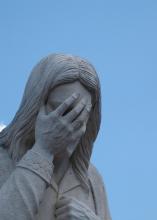
In response to my last article, “ 10 Things You Can't Do While Following Jesus,” I was accused multiple times of being political. All I was trying to do was follow Jesus. So, I thought it'd be interesting (and generate tons more hate mail) to show what a list would actually look like if I were being political intentionally. Like the first list, this is not a complete list, but it's a pretty good place to start.
There will be those who comment and send me messages berating me for “making Jesus political.” It's OK. Fire away. Jesus didn't worry much about stepping on political toes, and the Bible insists that governments be just toward the least of these (the books of the prophets alone make this point very clear). Frequently, people who are the most vocal about not making Jesus political are the same people who want prayer in school and laws based on their own religious perspectives. By a happy little circumstance that brings us to my list:

Lots of people claim to be “following Jesus” and then they do stuff like this. Sure, people who follow Jesus do these things all the time, but you can't say you are doing them because you are trying to follow Jesus' example.
(Clearly, this is not a complete list but it's a good place to start).
10) Exclude people because they practice another religion.
Jesus was constantly including people, and he did it with a radical disregard for their religion. We do not have a single recorded incident of Jesus asking for a person's religious affiliation before being willing to speak with them or break bread with them. We do have several records of Jesus seeking out those who happen to practice faith differently from him. There was even this one time when he used a hated Samaritan as an example of how we are supposed to take care of each other.
TWO YEARS AGO, Jeff Chu found himself at a crossroads. Like many gay Christians, he felt disconnected—condemned by a wide swath of his fellow believers because of his sexual orientation, questioned because of his faith by some in the LGBTQ community who have been pushed out of the church by the words and actions of many Christians. To top it off, there was that lingering doubt, so common among those raised in evangelical households: Does Jesus really love me?
To answer that question, Chu—an award-winning writer for Time, The Wall Street Journal, andCondé Nast Portfolio and the grandson of a Southern Baptist preacher—took off on a yearlong cross-country pilgrimage, “asking the questions that have long frightened me.” What he encountered was a divided church, “led in large part by cowardly clergy who are called to be shepherds yet behave like sheep.”
Many of the pastors Chu contacted for the book refused to speak with him, citing their suspicion of him as a member of the so-called “‘liberal media elite’” or stating bluntly that engaging on such a controversial issue might jeopardize funding for a pet project. After speaking with Richard Land, then-president of the Ethics & Religious Liberty Commission of the Southern Baptist Convention, and David Shelley, a Baptist minister from Tennessee affiliated with the Family Research Council, Chu concludes that they “devote much more time talking about legislation than about love.”
Then there are those he interviewed who are known more for screaming than talking. In meeting with members of the infamous Westboro Baptist Church, Chu does not shy away from controversy—or his own fears. “Some nights before my departure,” he recalls of the days before his trip to Kansas, “I had nightmares, and many mornings I’d wake with my jaw tight and teeth clenched.” His encounter with Rev. Fred Phelps, the grizzled, homophobic pastor of the church, is perhaps the most riveting of the book, culminating in a surreal, grudging offer of friendship from Phelps.
WHEN I FIRST started attending the Church of the Apostles in Fairfax, Va., we had no church building and met in the cafeteria of an elementary school. There were about 50 of us and a brand new priest, Rev. H. Lawrence Scott (“Call me Renny”). It was an Episcopal church in Fairfax County in the 1970s. Really, how much trouble could I get into?
What I didn’t know was that it was a charismatic, Bible-believing, tongues-speaking church. The praise band led us in worship. We sang and raised our hands. There was speaking in tongues and interpretation.
When I committed my life to Jesus in October 1977, I was sitting in the living room with Renny and his wife, Margaret. We had lunch. We talked. I disagreed with them about this Jesus stuff. We talked some more, and I was shocked to find myself saying “yes” when Renny asked if I was ready to commit my life to Jesus. I just said sure—then Renny made me pray. I remember walking to the car and having a brief conversation with God, the culmination of which was that I said I would never be a missionary to Africa. It’s funny what I thought were the key questions then.
Because I am an all-or-nothing person, I threw myself entirely into this new life. Within a few weeks I was baptized in the Spirit. I went to a Bible study every week. When I heard you were supposed to have a quiet time, I did that religiously. Every morning I sat and waited on God: Bible reading and prayer, other spiritual reading, and index cards to help me remember. Every morning for years I got up very early and met with Jesus in the quiet before dawn. Between my study and the praise songs we sang at church, I learned hundreds of scriptures by heart.

While the consequences of social privilege are alarming for numerous reasons, we are reminded that such systematic inequalities are by no means unique to the current day and age. For example, during Jesus’ ministry he encountered a predominant culture that distributed a wide variety of elite benefits based upon gender, class, ethnicity, and other forms of false favoritism. However, one of the primary distinctions of Jesus’ life, which he continually modeled for his disciples, was a prophetic confrontation with unjust structures of social privilege.
As Jesus accompanied women, tax collectors, lepers, prostitutes, and others firmly placed on the underprivileged margins of society, he repeatedly sought the reversal of embedded discrimination and disadvantage. In doing so, not only did Jesus promote Good News of eternal life for after death, but he sought to “let the oppressed go free” (Luke 4:18) for the fullness of life after birth.
While Jesus continually endorsed the revolution of unjust social privilege, and although he taught his followers to do likewise in his name, the harsh reality is that privilege based on prejudice is profitable, which makes it difficult – if not impossible – for those in power to surrender voluntarily
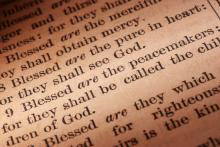
Jesus says some stuff in the inaugural speech of his ministry that really upsets the status quo of both the religious and non-religious. In essence, he says, "If you are to follow me as King of this newly inaugurated Kingdom of God, you will need to start loving your enemies as much as yourself. You will need to start getting creative in how you deal with your oppressors in order to choose the way of love and reconciliation rather than the way of revenge and contempt. In fact, when you live as peacemakers, you best reflect what it looks like to be children of God. Those of you that choose this way of life will be blessed."
A few years later — after Jesus has been announcing the good news of the Kingdom through both word and deed — he looks over Jerusalem and begins to weep. Here is the people and the city that is to symbolize right relationship with God and humanity. It is to be a place of shalom where salvation flows through all aspects of life. It is to be the city of peace. Instead, Jesus stands on the Mount of Olives overlooking the city and laments, "If you, even you, had only recognized on this day the things that make for peace!"
Finally, Jesus, as king, messiah, and deliverer models this way of life to the point of death on a cross. Refusing to accept the lure of power through military might or pursuing peace through violence, Jesus embodies the life of suffering and self-sacrifice that he is calling his followers to emulate. Jesus, as the ultimate peacemaker, shows us that the life and work of peacemaking isn't some fairy tale euphoria, but the gritty, subversive and sacrificial life of faithfulness to a God and kingdom that lives by a different standard than the systems and powers of the world.
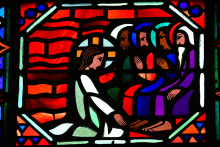
“HAVE YOU BEEN born again?” The image of a second birth to illustrate conversion is often used by fundamentalist and conservative evangelical Christians. Yet in my experience such folks also tend to resist thinking of God as other than male. How can they overlook this very maternal activity of God’s Spirit?
Even Nicodemus gets it, at least at the physical level. In John 3, this high-ranking Jewish leader privately approaches Jesus to ask him where his charism comes from. In most familiar translations of the New Testament (such as King James and NIV), Jesus tells Nicodemus that he would understand if he were “born again” (3:3). But the Greek word anōthen is deliberately ambiguous. Jesus’ intended meaning is “born from above” (NRSV). “That which is born of the Spirit is spirit,” says Jesus in verse 6. The Holy One is our birthing mother.
When the literal-minded Nicodemus asks how a person can go back into his mother’s womb and be born again, we cannot be sure (in 3:9-10) whether Jesus gently chides or sarcastically puts him down: “Are you a teacher of Israel, and yet you do not understand these things?”
Sadly, many “teachers” throughout Christian history have not understood these things. It is now 50 years since Betty Friedan’s The Feminine Mystique opened the floodgates of second-wave feminist cultural analysis, thus preparing the ground for biblical scholars and theologians such as Letty Russell, Rosemary Radford Ruether, Elizabeth Schüssler Fiorenza, and many more. Some of us began to see that orthodox, “objective” methods of interpretation were instead often subjectively male-oriented. We began to ask, “Where is the feminine in our sacred texts? Were women there?”
I see five ways in which the gospel of John deconstructs, or at least unsettles, the rigid patterns of patriarchy in the family and society in which Jesus lived. The roles Jesus played during his life and ministry were so atypical that they color this entire narrative.

In the fourth chapter of John’s Gospel Jesus speaks with a woman when they find themselves alone at a well at midday. We can learn a lot from what he says to her, and from what he chooses not to say.
Jesus tells the woman, “Go, get your husband, and bring him here.” She replies, “I have no husband.” Jesus tells her “That’s right. You’ve had five husbands, and the man you’re now with isn’t your husband.”
These could have been shaming words. In her culture, to be without a husband is to risk economic ruin, and to have been divorced by your husband is to be shamed.
Had he wanted to, Jesus could have scored some serious points here: I’m a prophet, and you’re a sinner. I’m celibate, and you’re promiscuous. You are living in sin by living with a man who is not your husband.
Evidently, he didn’t want to say those things.
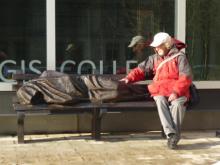
TORONTO — This homeless Jesus can barely find a home.
Canadian sculptor Timothy Schmalz notes the ironies in his latest creation, “Jesus the Homeless,” a bronze sculpture depicting the Christian savior huddled beneath a blanket on an actual-size park bench. Only the feet are visible, and their gaping nail wounds reveal the subject.
“If Jesus was watching the streets today,” Schmalz says from his home in St. Jacobs, Ontario, “I think he would want himself represented as one of the most marginalized. That’s what he said in the Gospel.”
Indeed, as Schmalz notes, Jesus calls on his followers to clothe the naked, feed the hungry, and tend to the lame. Possibly referring to himself, Jesus says, in the book of Matthew, that “the Son of Man has nowhere to lay his head.”